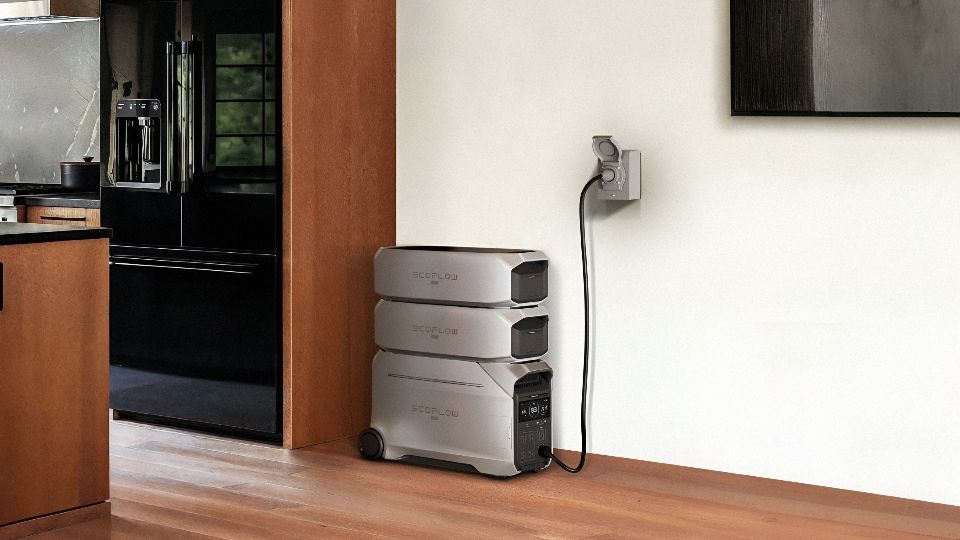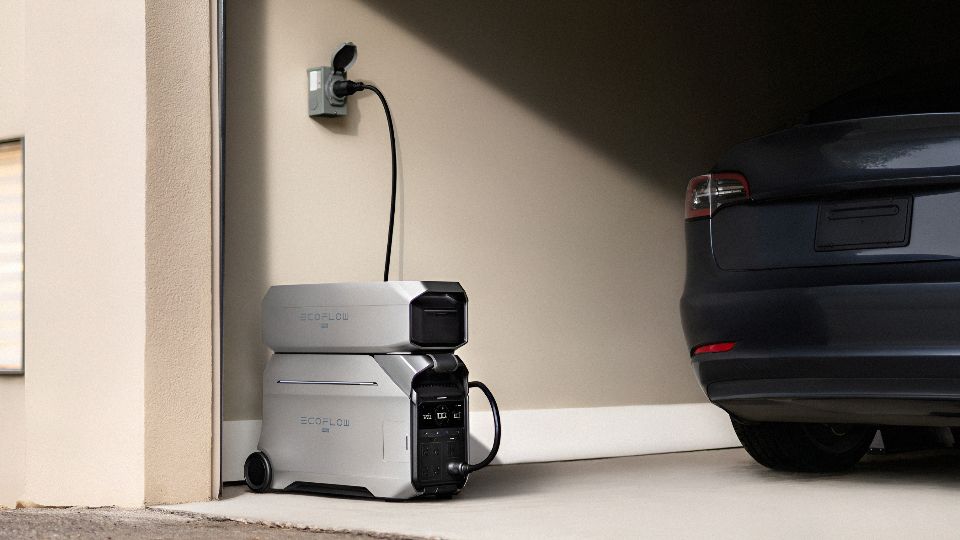Solar Batteries for Homes: What They Are and How They Work
More homeowners in Canada are seeking ways to reduce their electricity bills and have more control over their energy. Solar batteries are becoming an important part of this shift, storing the electricity your solar panels produce so you can use it when the sun isn’t shining. Besides storing power, they can also serve as a battery backup during a power outage.
Even though solar batteries are gaining attention, selecting which one is right for your home can be overwhelming. Each type has its own strengths, weaknesses, and considerations that can affect performance, cost, and lifespan. This article will guide you through everything you need to know about solar batteries, helping you make the best decision for your home.
What Are Solar Batteries, and How Do They Work?
Solar batteries are designed to store the excess electricity your solar panels produce so you can use it later when the sun is not shining. Instead of sending that excess power back to the grid, the energy is kept in your battery for nighttime use or during peak hours. It gives you more control over how and when you use the electricity you generate.
The process is simple once you picture it. Your solar panels generate electricity during the day, and any power you do not use immediately is stored in your battery. When the sun goes down or the energy demand spikes, the battery steps in to power your home. This allows you to run your home more efficiently without depending so heavily on the grid.
Types of Solar Batteries
When choosing between solar batteries, you will encounter several types, each with different chemistry and performance characteristics. The three most common options are lithium-ion, lead-acid, and flow batteries. Understanding their differences helps you find the right storage solution.
Lithium-Ion Batteries
Lithium-ion batteries are currently the best solar batteries for most residential systems. They are lightweight, compact, and highly efficient. They can offer up to a 90 percent or higher discharge rate. This means you can use most of the stored energy without harming the battery.
Another reason lithium-ion is considered among the best batteries for solar systems is its longevity. These batteries last 10 to 15 years with minimal maintenance. While upfront costs are higher, their longer lifespan and efficiency make them cost-effective in the long run.
Lead-Acid Batteries
Lead-acid is the traditional battery technology, known for its affordability and wide availability. These systems are often chosen by households that want a lower entry cost for solar storage. However, they typically allow only about 50 to 80 percent depth of discharge, meaning you can use only a portion of the stored energy without risking damage.
Lead-acid batteries are sometimes used for cottages, rural properties, or off-grid applications where cost is a priority. They are also recyclable, which adds environmental value. Still, if you are seeking the best solar power batteries, lead-acid is usually a short-term or budget-oriented option rather than a future-proof solution.
Flow Batteries
Flow batteries use liquid electrolytes stored in external tanks, making them highly scalable and capable of nearly 100% depth of discharge. They excel in large commercial or utility-scale systems but are too costly and bulky for most homes, though future advances may change that.
Although promising, flow batteries are rare due to their high upfront cost and large size. Still, as technology advances, they could become part of the best solar batteries for solar panels for households seeking long lifespans and high capacity.

Factors to Consider When Choosing a Solar Battery
Selecting the right solar batteries requires more than just comparing prices. Each household has unique needs based on energy use, budget, and long-term goals. Below are the key factors you should evaluate before making a decision.
1. Battery Capacity
The first thing to look at is how much energy the battery can store. It is typically measured in kilowatt-hours (kWh). If you’re asking, what are the best batteries for a solar system, one with sufficient capacity to cover your daily consumption is essential.
Be realistic about your household’s energy needs so you don’t end up with a battery that’s too small or unnecessarily large. Some models, such as an EcoFlow portable power station, even feature expandable batteries that can power your home for days, weeks, or even a month.
2. Depth of Discharge (DoD)
Depth of discharge indicates how much of the battery’s stored energy you can safely use without causing damage. If you’re looking for the best solar battery, aim for one that balances high DoD. Batteries with a higher DoD allow you to use more of their stored energy, making them more efficient and cost-effective.
3. Battery Lifespan
A battery’s lifespan is influenced by its chemistry, usage, and environmental conditions. Lithium-ion batteries, for example, typically last 10 to 15 years, while lead-acid options are often shorter. The best solar power batteries come with strong warranties that cover both capacity and defects, giving you peace of mind. Checking the manufacturer’s warranty and expected cycle life helps you avoid surprises down the line.
4. Cost vs. Long-Term Value
While the upfront price is important, consider also the long-term value. The best batteries for solar should offer a balance of cost, performance, and durability so that you don’t end up paying more for replacements or maintenance. A higher upfront cost may be worthwhile if it results in more reliable and longer-lasting solar batteries.
5. Compatibility and Integration
The best solar batteries for solar panels work seamlessly with every solar system. Not every option will connect successfully to your existing setup. Therefore, you need to ensure compatibility with your existing panels and inverters.
For example, the EcoFlow DELTA Pro 3 Portable Power Station is a standout option as it can function in both on-grid and off-grid situations. It can be integrated into your solar system when paired with a smart home panel, inverter, transfer switch, or when switched to the inlet box.

How Long Do Solar Batteries Last?
Lithium-ion solar batteries typically last between 10 to 15 years, with some high-quality models reaching up to 20 years. The lifespan depends on their type, usage, and environmental conditions. Lithium iron phosphate (LiFePO4), which is present in EcoFlow portable power stations, is especially durable.
This specific chemistry of lithium-ion often sustains thousands of charge cycles before its capacity drops to 70–80% of the original. In comparison, lead-acid batteries generally last shorter due to their shorter cycle life and greater sensitivity to deep discharges. Proper installation and regular monitoring are key to extending lifespan.
How Much Do Solar Batteries Cost?
The size and storage capacity of the battery affects the price. As noted by Solar Guide Canada, a 5 to 15 kWh residential battery system usually falls within the $10,000 to $20,000 range, with higher prices reflecting larger storage capacities and longer warranties. Labor rates and the complexity of integrating the battery with your solar setup can also influence the final price.
Fortunately, there are financial incentives available to help offset the initial costs of installing solar batteries. For instance, BC Hydro offers a battery rebate program for eligible residential customers, providing up to CAD $5,000 for the installation of battery energy storage systems. If you live in British Columbia, this rebate can significantly reduce your overall expenses.
Tips for Extending the Lifespan of Solar Batteries
Investing in solar batteries is only the first step toward energy independence. To maximize your return on investment, you need to maintain them properly. Below are some proven ways to extend battery lifespan and performance.
1. Maintain Proper Temperature
Batteries are sensitive to temperature. Too much heat or cold can shorten their lifespan. Try to install and store them in a cool or well-ventilated place. If your setup is outdoors, consider protective housing to shield it from extreme weather conditions. Stable environments help prevent stress on the battery and keep it running smoothly.
However, if you’re using the EcoFlow DELTA Pro Ultra Whole-Home Backup Power, you don’t have to worry about extreme weather. It’s designed to handle the most grueling conditions, whether it's extreme weather or freezing winters. Specifically, it can tolerate operating temperatures between -20°C to 45°C. With an IP54 rating, it’s also dust-proof and splashproof.
2. Avoid Overcharging
Consistently charging a battery to 100 percent can degrade its cells over time. It’s best to keep your charge cycles within a healthy range, ideally between 20% and 80% of capacity. Use smart inverters and monitoring systems that regulate charging cycles. This prevents stress on the battery and extends its lifespan.
3. Use Batteries Regularly
Batteries perform better when used consistently rather than sitting idle for long periods. Regular cycling keeps the internal chemistry active and prevents stagnation that can reduce capacity over time. Even if you don’t need the full backup, try to use your battery even once a week.
4. Monitor System Performance
Most modern systems come with apps or dashboards for tracking usage. Regular monitoring alerts you to irregularities that could indicate early problems. Early detection of unusual patterns can help you address issues before they cause damage.
EcoFlow DELTA Pro Portable Power Station, the world’s first portable home battery designed for home backup, is an example of solar batteries with a smart management system. Through the EcoFlow app, you can monitor your energy habits or even customize your energy usage.

5. Schedule Professional Maintenance
Schedule annual or semi-annual inspections by certified technicians to help you keep all components in good condition. Technicians can check wiring, connections, and the overall health of your battery. Regular servicing avoids small problems turning into costly repairs.
Conclusion
Choosing the right solar batteries means balancing cost, performance, and long-term reliability. With proper care, your system can deliver steady backup power and greater energy independence. For a future-ready solution, explore EcoFlow’s portable power stations and solar batteries — designed to keep your home running efficiently while helping you move toward a more sustainable lifestyle.
FAQs
What type of battery is best for solar?
The best type of battery for solar is generally a lithium-ion battery due to its high efficiency, longer lifespan, and compact design. Compared to lead-acid batteries, lithium-ion systems handle deeper discharges without significant capacity loss. They also charge faster and maintain more usable energy over time. If you want reliable performance with minimal maintenance, lithium-ion is usually the top choice. Choosing the right battery ensures your solar setup delivers consistent energy while protecting your investment.
How long will a 10kW solar battery last?
A “10 kW solar battery” usually refers to a 10 kWh solar battery, since batteries are measured in kilowatt-hours (kWh), not kilowatts (kW). A 10 kWh battery can typically last 10 to 15 years depending on the chemistry, usage, and environment. Lithium-ion versions can endure thousands of charge cycles, while lead-acid alternatives may only last 3–5 years. With proper care, avoiding deep discharges and extreme temperatures, a 10 kWh battery will give you reliable backup for more than a decade.
Is it worth getting a battery for solar panels?
Yes, adding a battery to your solar panel system is often worth it, especially if you want backup power or to maximize self-consumption of solar energy. A solar battery allows you to store excess energy generated during the day for use at night or during outages. While there is an upfront cost, long-term savings and energy security can make it a smart investment. Batteries also help reduce reliance on the grid and can be paired with incentives or rebates.